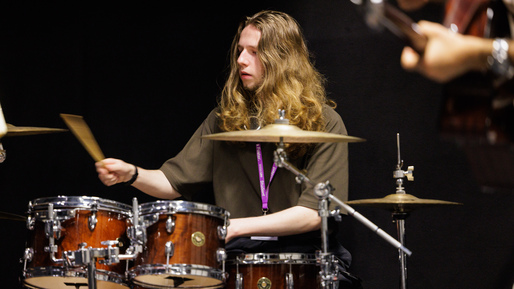Molly - Things you should know

As music is a creative subject, many of your assignments will be completing practical, composition tasks while showing your identity through your work. The more original thought you have in a piece the better you will stand out from your classmates and your lecturer can help you gain contacts with companies🎶
The first year is about figuring out student’s strengths and weaknesses. For example, highlighting if you are more classically trained but a beginner with technology or vice versa. Your lecturer’s aim is by the end of the year, every student will be on the same level. When I started university, I was a beginner at technology. I didn't know how to mix pieces or even use a DAW. My advice would be if you are like me, you may benefit from perhaps downloading logic on your laptop before you start university. If you are able to. Experiment with it so you are more comfortable when you start to use it in class. If you are unable to download logic, you could try to find a free DAW software to even watch logic tutorials on YouTube and write notes. This was a lifesaver for me! It saved me loads of time so I could focus more on what I wanted to write, rather than how to write it🎧
The course is divided up into two semesters: Semester A (September to December) and Semester B (January to April). The music composition and technology group works closely alongside the song writing classes, so you can also work together on some assignments🎤
The main format of our classes is that you start the semester receiving your assignments in the first few weeks. You will have around 6 for the first year. I found this beneficial as I was able to plan my deadlines over a month ahead. Your classes at the start of the semester will start by working with your whole class. Understanding the assignment and learning about the module. Later, when you have started your assignment, there will be tutorials with your lecturer and smaller groups to show your work and ask questions. Your lectures and tutorials are designed to help you complete each lecturer’s assignment. So, there is plenty of time to ask questions, show your progress on assignments and receive detailed and helpful feedback.
Your assignments will range from theory, instrumentation and technology tests. Composing to films, adverts and games. Collaborative compositions, conducting or singing course and an essay from time to time. If you struggle with essay work, you can contact your course leader or student support. They will be happy to help you. After these two semesters, the university hosts a “Sonic Herts Festival” where you can work with a range of students within the Creative Arts school. This is a time to show off your talent in a non-graded way and make contacts for future collaborations.
I wish you the best of luck starting university. It will feel daunting at first, but the experience will be rewarding. The Creative Arts School at Hertfordshire is a friendly and encouraging environment. We look forward to seeing you in September!😊💫